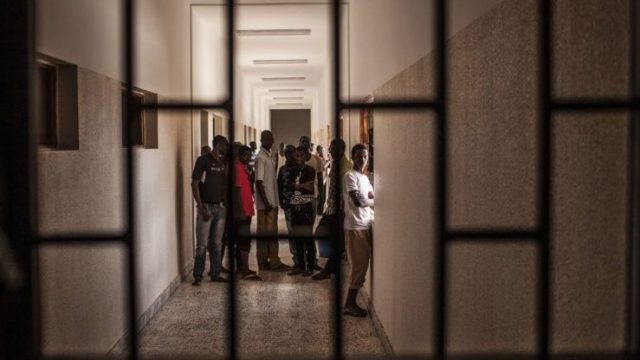When Mohammed slaved away on his owner’s tomato field in Libya, he would often remember the days he was free.
From Niger, Mohammad fled his home when Boko Haram militants raided the area. He paid smugglers to take him across North Africa and into Europe, but upon arrival in Libya he and other migrants were captured by a Libyan militia.
From then he spent three years thrown into prison, held for ransom, and bought and sold into bonded labor.
While Mohammad says he has heard of the now infamous slave auctions in Libya, he was bought and sold directly from the detention centers holding him and other African migrants.
NPR spoke to five men from Gambia, Nigeria, and Senegal who are now being helped by the Red Crescent:
They didn’t witness the secret slave auctions reported by CNN, although they say they have heard of those. Instead, they describe Libya’s detention centers — a network of prisons, some of them sanctioned by the state as part of an effort to combat illegal immigration — as being the very places where migrants are “bought” and “sold.”
Boubaker Nassou, a 30-year-old from Gambia, describes the detention center where he was held as a “slave market” and as the “prison where they sell people.”
Like Mohammed, from Niger, the smugglers’ car that Nassou rode in was detained by a militia once he crossed into Libya. The migrants were bundled into another vehicle, and he says they were taken “straight to the prison where they sell people.”
Nassou added that a business has formed where migrants are bought from one detention center and sold to another for profit. “This man would come and say ‘I need one person,’ and they say, ‘This one is 400 Libyan dinar.’ ‘This one is 500.’ ‘This one is for 300’ and ‘this one is for 200,” he said.
Amnesty International published a report in December of last year on the problem, estimating there are over 20,000 refugees and migrants being held in official detention centers that are technically run by the Libyan Interior Ministry’s Department of Combating Illegal Migration. Libyan authorities say are they investigating the abuses, but migrants still report that exploitation is widespread.
For Mohammad, life is still hard. He’s now working on an olive farm in Tunisia. “Here the work is little, and the money is bad. But at least there’s safety, and that’s what I want — to live my life in a safe place,” he said.







Freedom United is interested in hearing from our community and welcomes relevant, informed comments, advice, and insights that advance the conversation around our campaigns and advocacy. We value inclusivity and respect within our community. To be approved, your comments should be civil.